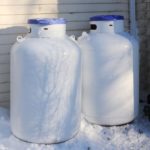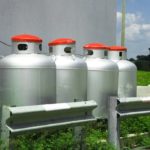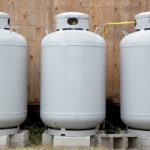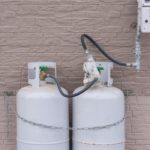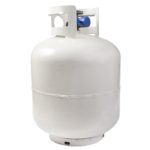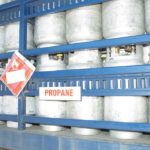Propane tanks are easy to use. However, there are also risks involved in using them, especially if they aren’t adequately stored. Since propane tanks are primarily used outside, you might be wondering if you can just leave them out exposed to the elements. What’s the worst that could happen? Surely it couldn’t explode…could it‽
Propane tanks can’t just explode in the sun, but they still shouldn’t be placed in direct sunlight. Leaving a propane tank in the sun will heat it up, which could lead to a gas leak and a possible fire outbreak. Always keep your propane tank in a well-ventilated enclosed space to avoid this.
Storing your propane tank away from direct sunlight isn’t the only way to ensure it doesn’t become a fire hazard. There are other things you need to know about properly storing a propane tank, which will be explained in this article. We’ll also talk about how to properly store your propane tank in the Winter. Read on!
How Hot Can a Propane Tank Get Before It Explodes?
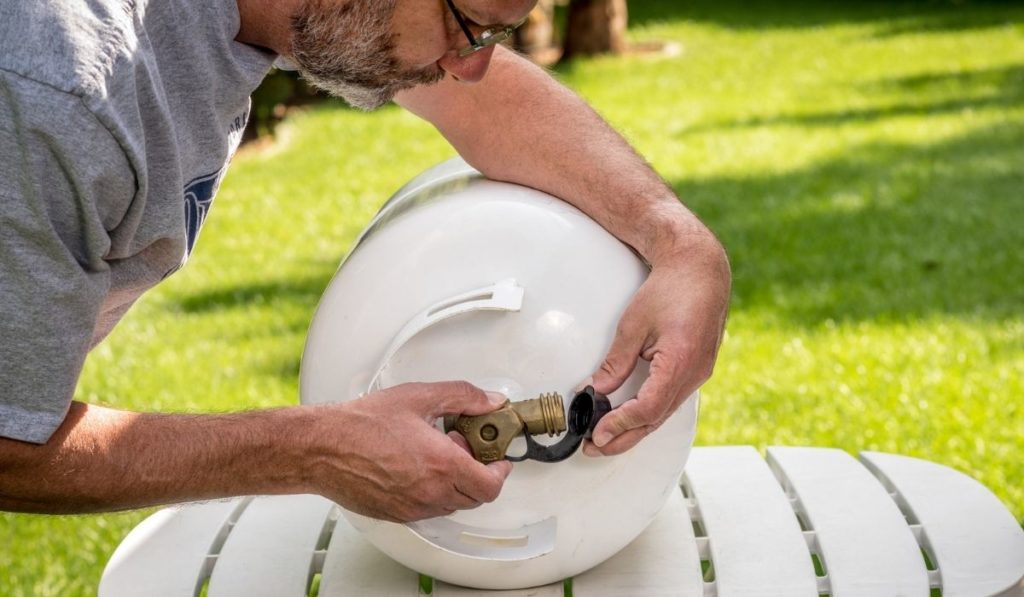
As efficient as propane tanks are, they can become a fire hazard if they’re not handled properly. Heat and propane tanks don’t mix – high temperatures cause propane to swell and increase the pressure in the tank. When this happens, the metal of the propane tank could get damaged.
That means you have to keep your propane tank away from direct sunlight. Placing it in direct sunlight can cause the tank to reach temperatures up to 49°C (120°F), which can have damaging effects.
In the same vein, you also have to pay attention to the color of your tank. This is because the color will affect the internal temperature of the tank.
Don’t use colors like black or any other dark color that will absorb heat. Stick to reflective colors like white or gray. However, the tank can still get hot, even if you use the right colors.
While these tanks might not explode, it’s still advisable to keep them away from hot places that will cause the propane to expand. Increased pressure will lead to cracks appearing in the propane tank, which would lead to leaks. As propane is highly flammable, a leak can lead to a fire if it comes too close to an open flame.
Where to Store Propane Tanks in The Summer
Summer is a beautiful time of year, but it’s also the season with the most fire incidents due to the hot weather. To avoid the fire hazard that your propane tank might become, you have to know where and how to store it in the summer.
It’s more than simply placing the tank away from direct sunlight. That is great, but not enough. Even away from the sunlight, propane tanks can be dangerous if you don’t take other steps to store them properly.
The following are great places to store your propane tank:
Don’t Choose a Location Close to Your House
The first and most important thing to note when storing your propane tank is to keep it away from your house or other living areas. You should also store them away from enclosed areas like your garage or closed sheds.
Gas leaks don’t only occur when a propane tank is under direct sunlight. Other things can trigger a leak, which is why it’s better to choose a storage location that’s far from any living area. You wouldn’t want a fire incident anywhere close to home.
Experts recommend that your propane tanks should be kept in places at least 3 meters away from your house or other fire-prone areas.
Place your Propane Tank in an Upright Position
A propane tank shouldn’t be allowed to lie on its side or be placed on top of another tank. Doing this can increase pressure in the tanks and cause leaks, leading to a potential fire hazard.
It’s better to create a sturdy and balanced platform for your tank to stay on.
You can use plastic, wood, or concrete slabs as the platform. It all depends on what you want. No matter what platform or surface you choose, though, ensure it’s strong enough to hold the propane tank without causing it to shift at all.
You can also buy propane tank stabilizers to place your tank on and protect it from falling over. A good choice is the Camco 57236 Stabilizing Base (on Amazon).
Keep Propane Tanks In Well-Ventilated Areas
To store your propane tank, don’t keep them in closed sheds – ensure that the place you put it is well-ventilated. Propane tanks can release gas and other chemicals that be dangerous if the surrounding area isn’t well-aerated.
When there’s enough space in the air for these hazardous materials to travel through, it stops them from building up and prevents potential fire outbreaks. You need to take this into consideration when you’re constructing a shaded area for your propane tank.
Use materials that help with ventilation like lattice to build the top and outer sides. Lattice will provide enough ventilation while also ensuring that the tank is well protected from direct sunlight.
Make A Three-Sided Frame
The next step is to construct the frame around your tanks. In this case, three sides will surround the propane tanks, while the fourth side will remain exposed to allow for easy access.
The structure can be as big as you like as long as it’s ventilated enough. It’s better to build a larger shelter for the tanks inside to have more ventilation than a smaller one.
It’s up to you to choose the frame’s material and the budget you want. To keep the cover in place, you’ll need to use something you can secure. To do this, you can stake them in the ground or secure them to your backyard wall or fence.
Assemble The Sides and Roof
After you’ve finished your frame, you can now add the sides and the roof. You may choose to go with a creative cover or a simple structure. The choice is yours.
You should, however, ensure that the structure is well-ventilated for the tanks when designing the outer sections. Your propane tanks will remain shaded as long as the covered structure is kept away from direct sunlight.
Where To Store Propane Tanks In The Winter
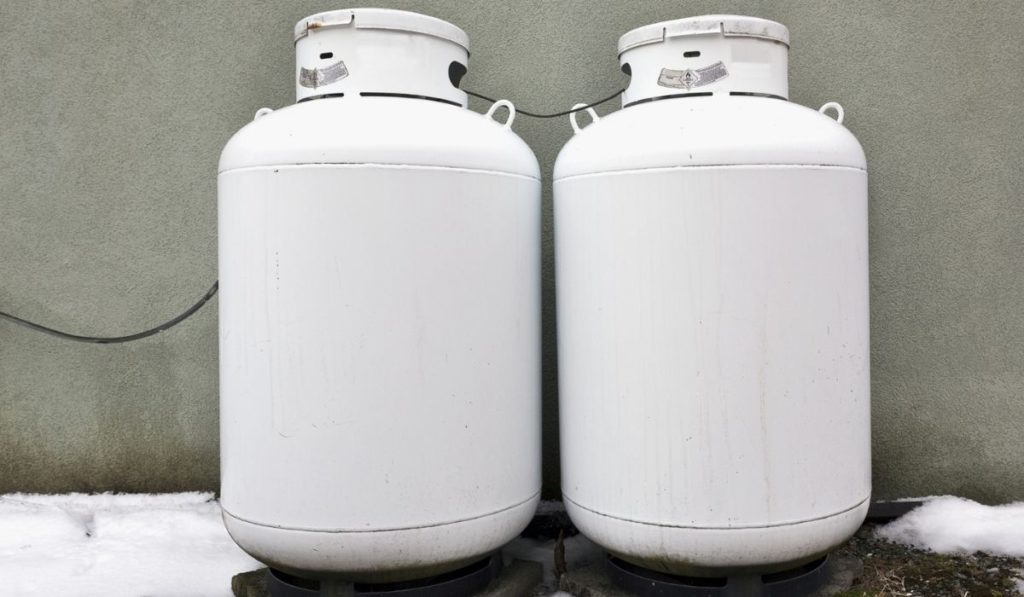
Propane tanks are not difficult to store in the winter, as they hardly pose a threat during this season. You can place your tank outdoor all winter, but you also have to protect it from the cold elements, as propane tanks shouldn’t get too cold.
To do this, you can cover the propane tank with a plastic tarp or electric blanket to stop the buildup of ice or snow on the tank.
Other Storage Tips for Propane Tanks
There’s no doubt that propane tanks are easy and efficient to use, but that doesn’t remove the various risks they can pose if you don’t check out some other things. It takes more than simply knowing where to store your propane tank.
There are more essential storage tips you need to pay attention to ensure that nothing goes wrong with your tank. Below are other storage tips for propane tanks:
Check For Leaks Or Cracks
There might be leaks or cracks in your propane tank before storing it, and it could be hazardous if you don’t check for them before storing it. Checking for leaks and cracks will let you know if you need to replace it or fix it.
One way to know if there’s a gas leak is if you notice a sulfur-like smell or if there are bubbles on the tank. If you notice either of these signs, you can turn off the valve and call the Fire Department. You can also have a professional check for leaks and damages to ensure that you aren’t leaving anything out.
Inspect The Valves
Most propane tanks have pressure relief valves, and you need to check them out before storing your tank. These valves will let you know if there’s an increase or decrease in the tank pressure. Having an idea of this will help you know if there’s a problem that needs fixing, and you can always contact a professional to handle the situation.
Don’t Store Full Propane Tanks Inside
If you have to store propane tanks indoors, ensure they’re empty. An empty propane tank is hazard-free. Once there’s propane in your tank, place it outdoors in a well-ventilated area.
Replace Expired Tanks
Expired propane tanks are dangerous, so confirm that they aren’t expired before storing them. If it turns out that your propane tank is expired, you can contact the manufacturer to request an exchange or recertification. Recertification is only possible if the tank is not totally out of shape.
Don’t Smoke Near Tanks
Propane is highly flammable, so you have to keep flammable materials far away from it. That means you can’t smoke near a propane tank. It can cause a fire.
Don’t Let Your Propane Tank Get Too Hot
Ensure that your propane tank doesn’t get hotter than 49° C. Also, don’t let the temperature go below -40° C. This means you have to pay attention to the weather conditions and store it accordingly. For hot weather, place in a shade and keep outside but cover with a tarp during the cold days.

